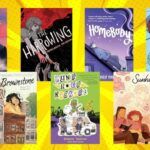
When Poetic License Goes Too Far
This is a guest post from Tiffany D’Abate. Born in Kentucky and raised in Tennessee, Tiffany quickly learned that books + outdoors = happiness. After receiving her bachelor’s and master’s in English Literature, she swapped pine trees for palm trees and moved to South Florida, where she became a freelance proofreader. She now works as an assistant managing editor for a financial publishing company. When she’s not at work, she’s bingeing audio books on the beach, inhaling cupcakes, or re-reading Jane Eyre for the thousandth time. Follow her on Instagram: @tiff_reads.
 The danger of being a writer is having friends who write. And who, oh-so-occasionally, write a novel. Then ask you to read it.
The danger of being a writer is having friends who write. And who, oh-so-occasionally, write a novel. Then ask you to read it.
Writing a book is an accomplishment, without a doubt. Whether it’s published at a huge conglomerate, hits the best-seller list, or appears quietly as a self-published novel, it takes time, commitment, and imagination to create a world within a novel.
Unless, ya know, you steal characters from real life to populate your book.
Recently, a family friend came out with her debut novel — a murder mystery of sorts. Although it’s not my favorite genre, I agreed to read it and post reviews for her, just to get the word out on the novel.
But then I started reading.
The main character: a man born to Italian immigrants. [That’s odd, I thought. That’s just like my husband.]
Said man owns his own bakery. [Uh-oh.]
Said man is named Marco. [Maybe … she’s just borrowing his name. (Yes: She used his real name.)]
Said man marries an attractive, twenty-year-old Italian woman and they have a beautiful daughter. [Alarms blaring: She just married my husband off to woman who is most certainly not me.]
Unfortunately, she was not just borrowing his name for this particular character. The looks, the sense of humor, the career, even the name and the heritage, are all my husband — to the tee.
I couldn’t, in all honesty, finish the book. I felt embarrassed and a little irritated. Did my husband’s friend not like me? Did she think he could do better? Was she using the written word as a dig at how my husband’s life might have gone, had he not married me?
The questions could go on forever. And, realistically, the only way to ever get the actual answers is to ask the author herself.
Sometimes the pen is mightier than the sword; and writers who wield it need to be extremely careful how they use their power.
If you need me, I’ll be over here reviewing libel laws.
I’ll turn it over to you: Have you ever included an acquaintance in your own writing? Or have you ever found yourself as a character in a friend’s novel?













